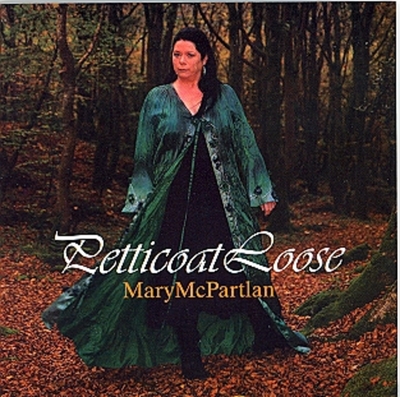Petticoat Loose
David Granville reviews Petticoat Loose, Mary McPartlan, Mac P Productions (MCPRCD002)

WITH SEVERAL decades of performing under her belt and an artistic career taking in theatre, television and a host of other cultural activities and initiatives, it's hard to believe that Petticoat Loose is only Mary McPartland's second album.
Born and raised near Drumkeeran in Co. Leitrim, she began performing as far back as the 1970s. Since the mid-1980s, she has lived in Galway, building a solid reputation on the Irish folk scene while demonstrating her many talents as a singer, producer, director and organiser.
The release of her first album in 2004, the award-winning The Holland Handkerchief (MCPCD001), brought her talents to a wider audience. This excellent follow up should attract even more admirers and accolades.
Officially launched in February at SIPTU's Liberty Hall Theatre in Dublin - an event which McPartlan herself described as a mix of song, music, politics and human rights - the album is a personal testament to the experiences and passions of the singer's life. Assisted by producer and multi-instrumentalist Seamie O Dowd and a host of other notable musicians, McPartlan's voice is clear, strong and passionate throughout.
Although unquestionably rooted in the traditional, the album includes a wide variety of styles and material. These range from traditional and contemporary Irish-language songs to six new and original works.
The album also includes material from different folk traditions, such as Leonard Cohen's Sisters of Mercy, Adrian Mitchell's song about the murdered Chilean poet and songwriter Victor Jara, and the Romanian drinking song Lumè Lumè - the latter track featuring the Romanian string quartet ConTempo.
The opening track, Sanctuary, is one of the three excellent collaborations between McPartlan and life-long friend, poet and playwright Vincent Woods and composer Mairtín O'Connor. A mining song, Woods' lyrics set Co. Leitrim's "coal pits of misery" against the sanctuary of home amongst the fields and "blue green mountains" of the singer's childhood and youth.
From the 15th-century onwards, Arigna in Co. Roscommon and the nearby Co. Leitrim mountains were famous for iron and, later, coal, mining. Although the last pits closed in 1990, McPartlan's two younger brothers both experienced the hazardous, backbreaking toil of the mines before emigrating.
The song from which the album tales its title is another Woods/O'Connor composition. Based on a wild and dangerous - to men - female character from the folklore of Tipperary and Kilkenny, it offers a beautifully sung, but lyrically dark angle on the war of the sexes. There's no doubt in this song as who gets the upper hand.
A champion of Irish culture and language, the inclusion of two beautiful old songs (Caoine Sheain Mhic Searraigh/Síos Faoi Braoch Loch Aileann) comes as no surprise. Set to music by Brendan O'Regan, both originate from McPartlan's native Drumkeerin.
Cúmha (A Parting Sorrow), written and composed by Padraig Ó hAoláin and translated by Tim Dennehy, is a new song from Connemara lamenting the changes to Irish rural life and values wrought by the spread of industrialisation and wage economy.
A powerful song in it's own right, McPartlan's inclusion of Mitchell's poem Victor Jara is a clear nod towards the singer's past involvement with the Chilean exile community in Ireland and the Chile Committee for Human Rights. Set to music by Arlo Guthrie, Michell's poem has been previously recorded by a host of notable artists, most memorably perhaps being Christy Moore and Dick Gaughan. By any standards, McPartlan's version stands beside these as their equal.
With originality and quality in abundance, Petticioat Loose looks set to ensure that McPartlan's reputation as one of Ireland's finest female vocal talents is spread even further afield.
Petticoat Loose is available from Copperplate Distribution and specialist outlets
Connolly Association, c/o RMT, Unity House, 39 Chalton Street, London, NW1 1JD
Copyright © 2008 David Granville

